|
|
|
Sort Order |
|
|
|
Items / Page
|
|
|
|
|
|
|
| Srl | Item |
| 1 |
ID:
159867
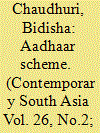

|
|
|
|
|
| Summary/Abstract |
The burgeoning influence of liberal market economy coupled with a ‘good governance’ paradigm across post-communist and post-colonial states emphasizes a market concept of equality, while turning ‘citizens’ into ‘customers’. This trend has been further accentuated by the massive inlets of Information Communication Technologies into governance mechanisms having a significant impact on the ways of governmentality and thereby on the substance and processes of documenting citizenship. It is in this wider context of intersecting economic and political changes that this paper captures the shifting regimes of citizenship in India as manifested through the processes of Unique Identification, or Aadhaar scheme, an initiative by the Government of India that seeks to give every Indian resident a unique identity documentation. Although Aadhaar does not authenticate citizen identity, nonetheless, in its promise to build a ‘national grid’ of identity information infrastructure, it indicates a meta-structure of a new inclusion/exclusion paradigm of citizen formation in India that appears to reinvent early liberal values of civic republicanism based on property rights. Rather than assessing the merits of this scheme, this paper demonstrates how new technologies of governmentality could impact the citizenship regime in India while keeping with the demands of a growing neo-liberal political economy.
|
|
|
|
|
|
|
|
|
|
|
|
|
|
|
|
| 2 |
ID:
159871


|
|
|
|
|
| Summary/Abstract |
Identity cards and surveillance practices form an important part of migrant experience and politics. Drawing on fieldwork in construction sites and factory premises in Ernakulam district and a market frequented by migrants in Perumbavoor, a small city near Kochi in Kerala, this paper argues that ID-based surveillance of migrant workers occurs through a complex spatial web of state repression, local power structures and fissures within the classes of workers in Kerala. Migrant workers from North and Northeastern India, and unionized Malayali workers in construction sites and factories in Kerala, battle for and against these cards. Migrant workers resist not necessarily class power that inheres in capital, but the state and surveillance practices.
|
|
|
|
|
|
|
|
|
|
|
|
|
|
|
|
| 3 |
ID:
159866
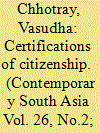

|
|
|
|
|
| Summary/Abstract |
Experiences in the post-partition Indian subcontinent refute the conventional expectation that the ‘possession of citizenship enables the acquisition of documents certifying it’ [Jayal 2013. Citizenship and Its Discontents: An Indian History. Cambridge, MA: Harvard University Press, 71]. Instead, identity papers of various types play a vital part in certifying and authenticating claims to citizenship. This is particularly important in a context where the history of state formation, continuous migration flows and the rise of right-wing majoritarian politics has created an uncertain situation for individuals deemed to be on the ‘margins’ of the state. The papers that constitute this special issue bring together a range of disciplinary perspectives in order to investigate the history, politics and materiality of identity documents, and to dismantle citizenship as an absolute and fixed notion, seeking instead to theorise the very mutable ‘hierarchies’ and ‘degrees’ of citizenship. Collectively they offer a valuable lens onto how migrants, refugees and socio-economically marginal individuals negotiate their relationship with the state, both within South Asia and in South Asian diaspora communities. This introduction examines the wider context of the complex intersections between state-issued identity documents and the nature of citizenship and draws out cross-cutting themes across the papers in this collection.
|
|
|
|
|
|
|
|
|
|
|
|
|
|
|
|
| 4 |
ID:
159874
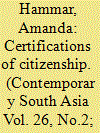

|
|
|
|
|
| Summary/Abstract |
A focus on certifications of citizenship as a range of inter-related practices of identity classification, categorisation, registration and validation, provides productive opportunities to explore the many ways that different authorities and/or different citizens engage with both the meaning and materiality of identity documents. At the heart of such practices is a complex politics of recognition that in turn is linked to the political economies of certification and of certificates themselves. A selection of African cases helps to highlight some of the paradoxes of certification – such as its simultaneous openings and closures – while pointing to the relationality of its multiple dimensions, including: the material, symbolic, social, spatial, temporal, demographic, political and institutional. These overlapping dimensions manifest in site-specific ways across different empirical contexts in Africa and Asia and beyond, making transnational conversations especially meaningful for deeper understandings of the complexities of the authority-certification-citizenship nexus.
|
|
|
|
|
|
|
|
|
|
|
|
|
|
|
|
| 5 |
ID:
159869


|
|
|
|
|
| Summary/Abstract |
In recent years, the Pakistani state has made significant advances in formalising and universalising citizenship through the digitisation of citizenship numbers. The National Database and Registration Authority (NADRA) is at the forefront of this initiative, which has now covered 96% of Pakistan’s 180 million citizens. The state successfully used this digitisation of citizenship to reach out to its citizens in the aftermath of a large-scale flooding disaster in 2010 and 2011. The universal cash transfer programme instituted for disaster-affected households used citizenship numbers to identify and then provide ATM cards to those domiciled in the worst-affected regions. This paper draws upon my fieldwork done in 2012–2013 in Lower Sindh and argues that while still in its infancy, a new form of ‘disaster citizenship’ is visible in southern Pakistan, which is driven partially by this digitisation of citizenship in the country. It explores the post-disaster political space where state actors and citizens came to interact with each other, and argues that these informal and unplanned interactions overlapped with formal policy to result in a new and emerging form of ‘disaster citizenship’ in the region.
|
|
|
|
|
|
|
|
|
|
|
|
|
|
|
|
| 6 |
ID:
159868
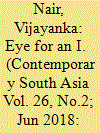

|
|
|
|
|
| Summary/Abstract |
In 2009, the Government of India embarked on a mission to issue each of India’s over one billion residents a unique biometric identification number, Aadhaar (literally, ‘foundation’). An Aadhaar database would link the demographic and biometric information (iris scans, fingerprints, facial photograph) of residents to a 12-digit number. India currently commands the world’s largest biometric database. While Aadhaar does not guarantee citizenship, benefits, or services, its architects submit that its reliable, real-time identity verification infrastructure potentially allows for the targeted delivery of any good to its intended recipient. Aadhaar is fashioned as an ID concerned with a pristine bodily uniqueness untarnished by the social, political, or economic. Aadhaar frequently provokes the questions: Who is the recipient of Aadhaar and to what community does Aadhaar afford membership? Based on ethnographic fieldwork in India’s capital, New Delhi, this article examines how Aadhaar comes to inform ideas of identity and belonging held by its implementers, as well as the population it targets.
|
|
|
|
|
|
|
|
|
|
|
|
|
|
|
|
| 7 |
ID:
159870
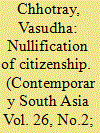

|
|
|
|
|
| Summary/Abstract |
This paper discusses the case of a community of Bengali immigrant settlers along the coast of Odisha in India at the centre of a unique citizenship controversy. Families have arrived here gradually over the years since 1947, and have generally acquired a range of identity documents from Indian state agencies. These documents certify to a range of rights that signal social and political participation within India: land ownership, voting rights and the receipt of official welfare subsidies. With little warning, a 2005 order by the state government following a high court directive led to the production of a list of 1551 persons, declaring such persons as ‘infiltrators’. The list ostensibly comprises those who have entered India illegally after 1971 or born to parents who entered illegally. While no deportation, as originally intended, has taken place, the nullification of their various documents of citizenship has created a void in their lives. This paper examines the wider politics of the case, especially focusing on how those with nullified documents negotiate the authority of the local state and actors within their own society, and what this reveals about the ever contested nature of citizenship in post-partition India.
|
|
|
|
|
|
|
|
|
|
|
|
|
|
|
|
| 8 |
ID:
159873
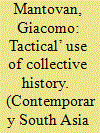

|
|
|
|
|
| Summary/Abstract |
This article focuses on how Sri Lankan Tamils construct their life histories for asylum applications in France. The construction of the truth in application documents is a crucial issue in citizenship requests and state-building: it determines who the asylum seekers are, and whether they will be integrated into the state or not. It is a citizen-making process, through which the state constructs its population and redefines its borders. This research has been carried out in a bureau drafting life narratives for asylum applications. It describes how the experience of persecution is transformed into an institutionalized biography through the work of a ‘public writer’. In particular, it shows that while the bureaucratic procedure follows the logic of ‘singularization’, a ‘tactical’ use of collective history plays a relevant role in the writing of these accounts: to give more credibility to theirs statements, asylum seekers use shared history to compose individual histories. Analysing the stakes and the various standpoints of the asylum demand, I will argue that the construction of truth, like the citizenship request itself, is not a simple matter of adapting to state laws and regulations, but is rather the fruit of the interaction between several actors with different interests.
|
|
|
|
|
|
|
|
|
|
|
|
|
|
|
|
| 9 |
ID:
159872
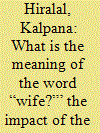

|
|
|
|
|
| Summary/Abstract |
This paper maps out the shifting and restrictive nature of immigration laws on the wives of resident Indians moving to South Africa. The turn of the century witnessed a gradual entry of women seeking to join their spouses in South Africa. However, on arrival some discovered that they were ‘prohibited’ immigrants, as Indian customary marriages came under intense scrutiny from immigration officials, Appeal Boards and courts. This paper argues that immigration and judicial officials, at times, became a law unto themselves by becoming official gatekeepers determining who was really a ‘wife’ and who could therefore enter the country. It shows how immigration officials, through a system of documentation and verification procedures, carefully scrutinised and monitored the entry of resident Indian wives into the Union. Thus, ‘what is the meaning of the word “wife”’ became a highly contested and complex issue at the turn of the century. The shifting and restrictive nature of immigration laws limited citizenship rights to resident Indian wives. This article adds to current debates on gender and citizenship in historical migrations amongst non-indentured, free Indian women immigrants to South Africa – a topic that is yet to be fully explored.
|
|
|
|
|
|
|
|
|
|
|
|
|
|
|
|
|
|
|
|
|